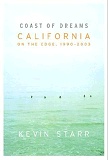
|

Gangs, violent crimes committed by teenagers, having no respect for life - this is how Kevin Starr in his
book 'Coast of Dreams - California on the Edge, 1990 - 2003' describes the 'dream state' and its society.
Here is an excerpt from Starr's book dealing with the 15-year-old Charles Andrew Williams who destroyed two
lives of his fellow students and wounded another 13 when he went on a rampage at his high school near San Diego
on March 5, 2001.
"Here was a boy, as Los Angeles Times columnist Sandy Banks
pointed out in a brilliant and compelling article, who for all practical pur-
poses was flourishing in the small Maryland town where he was born and
grew up. He was an honors student who loved theater and sports, played
board games with his father, and was respected by his peers as a peace-
maker capable of breaking up a fight. Then came the parents' divorce, and
blue-collar/middle-class suburb on the other side of the country-a place
where everybody was from someplace else, where hordes of white people
lived on the margin in near anonymity in quickly and shabbily built rental
properties indistinguishable one from another.
Santee was a city of 58,000 that, after the shootings, portrayed itself as a
Norman Rockwell kind of place that had been unexpectedly violated by
heinous violence. Others might have another opinion: marine lance corporal Carlos Colbert,
an African American, who three years earlier had been
severly beaten by five young white men because of his race; or another
black man and his sister who, just that November, had been persecuted by a
white resident, who referred to Santee as Klantee; or the young African-
American female student, recently moved to Santee from Japan where her
parents were in the military, who faced an onslaught of racial slurs en route
to school, in the hallways, in class. ("I feel more like a foreigner here," she noted,
"than I did in Japan.") Just before the killings at Santee, in January, Mayor Randy Voepel had asked
a local pastor to serve as the human relations advisor for the city when swastikas and racist literature
surfaced at Santana and another local high school.
Santee, in short, was showing the tensions and brutalizations of a society thrown together overnight:
of white people who were, simultaneously, arriving at better circumstances but also leveling out in
their mobility and experiencing the paranoia and anger that comes from being at a dead end. Charles
Andrew Williams's father was a computer programmer dropped in the middle of a lower-register San Diego
suburb, like everybody else around, who kept guns in his house. Motherless, unsupervised, his son
began to be formed -or rather de-formed -by the society and culture around him. In Maryland he had
been respected by his peers, and for a fifteen-year-old, this means everything. At Santana High he
had become the butt of aggressive bullying by older boys, who took the money out of his wallet and
taunted him because he was skinny and a geek and did not fit in. "He should have started fighting
people to get respect," said a sophomore after the killings. "Even the people who got picked on,
picked on him."
Williams's refuge, such as it was, became a nearby local park, where he hung out with other neglected
and marginalized young people, uncertain even in these relationships, skateboarding, experimenting with
alcohol and marijuana, brooding over his treatment at school. Whatever criminal he was soon to become,
however horrible would soon be his actions, Charles Andrew Williams was at that moment just another
trashed kid, unsupervised, uncared-for, surrounded by danger. He told his ragtag confederates that he
would soon be bringing his father's .22-caliber revolver to school and getting even. They mostly did
not believe him, although one adult - the boyfriend of the mother of one of the kids at the park -
hearing of the threat, did make a halfhearted effort to contact Williams's father, one telephone call,
but no one was at home to answer. And so, the youngster from Gaithersburg, Maryland, tiring of the effort
of fitting in - of becoming a Southern Californian, one might say - put the pistol in his backpack and
went to school, just another trashed kid, now on the verge of killing and trashing others. He was
crossing a line here, an adult line, between two evils: the evil he had endured and the evil he would
now perpetrate. Quite correctly, society would soon be judging him as an adult. Yet the question
lingered: Was society, in judging Charles Andrew Williams, also obliged to judge itself?"
From:
Coast of Dreams - California, pp.123/24

|

